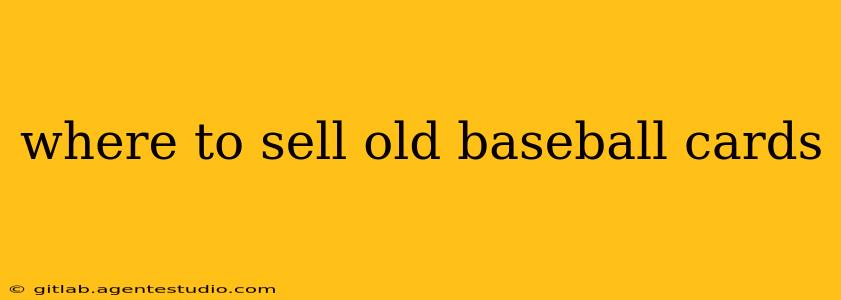So you've unearthed a treasure trove of old baseball cards – a dusty box in the attic, a forgotten shoebox in the closet – and now you're wondering, "Where can I sell these?" Selling your old baseball cards can be a rewarding experience, potentially turning nostalgic memories into a healthy profit. However, navigating the market requires understanding the various avenues available and choosing the best fit for your collection.
This guide explores the top options for selling your baseball cards, considering factors like card condition, rarity, and the size of your collection. We’ll help you maximize your return and minimize the hassle, turning your card-selling journey into a successful one.
Choosing the Right Sales Channel: Matching Your Cards to the Market
The best place to sell your baseball cards depends heavily on several factors:
- Condition of the Cards: Are your cards pristine, near-mint, or showing significant wear and tear? The condition dramatically impacts value.
- Rarity of the Cards: Do you have rookie cards, Hall of Famers, or other highly sought-after players? Rare cards command premium prices.
- Size of Your Collection: Are you selling a few valuable cards or a large collection? This impacts the sales strategy you should employ.
Here’s a breakdown of the most effective sales channels:
1. Online Marketplaces: eBay, COMC, and Others
Online marketplaces offer broad reach and can attract a wide range of potential buyers.
-
eBay: A giant in online auctions, eBay provides a huge audience, but requires understanding the platform's selling fees and policies. Successful eBay selling necessitates high-quality photos, accurate descriptions, and competitive pricing. It's ideal for selling individual high-value cards or larger collections.
-
COMC (Cards Online Marketplace): COMC specializes in sports cards and offers a user-friendly platform with built-in grading and verification services. They handle shipping and payment processing, reducing the seller's workload. It’s a great option for larger collections or if you prefer a less hands-on approach.
-
Other Online Marketplaces: Consider platforms like Facebook Marketplace, specialized sports card forums, or dedicated online card shops. Research each platform to understand their fees and user base.
2. Local Card Shops and Shows: Personal Touch and Instant Gratification
Local card shops and shows offer a more personal approach, allowing for face-to-face transactions and immediate payment.
-
Local Card Shops: Many shops buy cards directly from collectors. The prices might be lower than online marketplaces, but the convenience of a quick sale can be attractive. Shop around to compare offers.
-
Card Shows: These events bring together buyers and sellers, creating a competitive market. You can often get better prices than at local shops, but it requires attending the show and potentially negotiating with multiple buyers.
3. Private Sales: Targeting Specific Collectors
If you have exceptionally rare or valuable cards, a private sale can be the most lucrative option.
-
Networking: Connect with collectors who specialize in specific players or eras. Online forums and social media groups are excellent places to find potential buyers.
-
Direct Outreach: Research known collectors and reach out to them directly with offers. This approach is time-consuming but can lead to significant returns for high-value items.
Preparing Your Cards for Sale: Presentation Matters
No matter where you sell, proper preparation is crucial:
-
Clean and Protect: Clean your cards carefully (avoid harsh chemicals) and use protective sleeves and toploaders to preserve condition.
-
Accurate Grading: Knowing the condition of your cards is paramount. Learn grading standards (like those used by PSA or Beckett) or consider professional grading services.
-
High-Quality Photos: Use clear, well-lit photos to showcase your cards. This is vital for online sales.
-
Detailed Descriptions: Provide accurate information about the card, including player, year, set, and condition.
Conclusion: A Successful Sale is a Well-Planned Sale
Selling your old baseball cards requires strategy and careful planning. Consider the condition and rarity of your cards, your comfort level with different sales channels, and the amount of time and effort you're willing to invest. By thoughtfully choosing your sales method and preparing your cards appropriately, you can achieve a successful sale and potentially turn your collection into a valuable asset.

